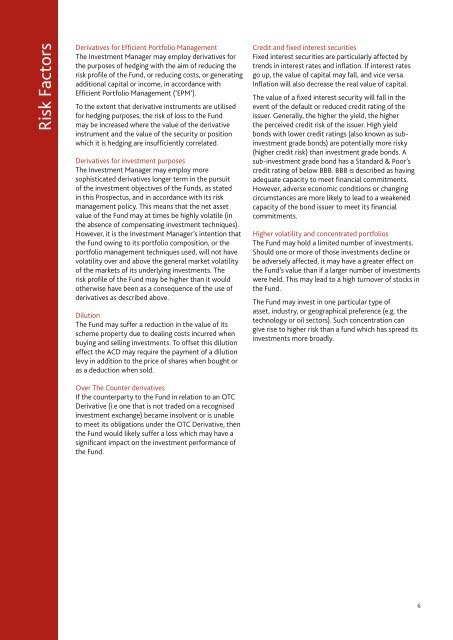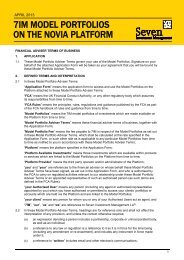CF 7IM Opportunity Funds - Seven Investment Management
CF 7IM Opportunity Funds - Seven Investment Management
CF 7IM Opportunity Funds - Seven Investment Management
You also want an ePaper? Increase the reach of your titles
YUMPU automatically turns print PDFs into web optimized ePapers that Google loves.
Risk Factors<br />
Derivatives for Efficient Portfolio <strong>Management</strong><br />
The <strong>Investment</strong> Manager may employ derivatives for<br />
the purposes of hedging with the aim of reducing the<br />
risk profile of the Fund, or reducing costs, or generating<br />
additional capital or income, in accordance with<br />
Efficient Portfolio <strong>Management</strong> (‘EPM’).<br />
To the extent that derivative instruments are utilised<br />
for hedging purposes, the risk of loss to the Fund<br />
may be increased where the value of the derivative<br />
instrument and the value of the security or position<br />
which it is hedging are insufficiently correlated.<br />
Derivatives for investment purposes<br />
The <strong>Investment</strong> Manager may employ more<br />
sophisticated derivatives longer term in the pursuit<br />
of the investment objectives of the <strong>Funds</strong>, as stated<br />
in this Prospectus, and in accordance with its risk<br />
management policy. This means that the net asset<br />
value of the Fund may at times be highly volatile (in<br />
the absence of compensating investment techniques).<br />
However, it is the <strong>Investment</strong> Manager’s intention that<br />
the Fund owing to its portfolio composition, or the<br />
portfolio management techniques used, will not have<br />
volatility over and above the general market volatility<br />
of the markets of its underlying investments. The<br />
risk profile of the Fund may be higher than it would<br />
otherwise have been as a consequence of the use of<br />
derivatives as described above.<br />
Dilution<br />
The Fund may suffer a reduction in the value of its<br />
scheme property due to dealing costs incurred when<br />
buying and selling investments. To offset this dilution<br />
effect the ACD may require the payment of a dilution<br />
levy in addition to the price of shares when bought or<br />
as a deduction when sold.<br />
Over The Counter derivatives<br />
If the counterparty to the Fund in relation to an OTC<br />
Derivative (i.e one that is not traded on a recognised<br />
investment exchange) became insolvent or is unable<br />
to meet its obligations under the OTC Derivative, then<br />
the Fund would likely suffer a loss which may have a<br />
significant impact on the investment performance of<br />
the Fund.<br />
Credit and fixed interest securities<br />
Fixed interest securities are particularly affected by<br />
trends in interest rates and inflation. If interest rates<br />
go up, the value of capital may fall, and vice versa.<br />
Inflation will also decrease the real value of capital.<br />
The value of a fixed interest security will fall in the<br />
event of the default or reduced credit rating of the<br />
issuer. Generally, the higher the yield, the higher<br />
the perceived credit risk of the issuer. High yield<br />
bonds with lower credit ratings (also known as subinvestment<br />
grade bonds) are potentially more risky<br />
(higher credit risk) than investment grade bonds. A<br />
sub-investment grade bond has a Standard & Poor’s<br />
credit rating of below BBB. BBB is described as having<br />
adequate capacity to meet financial commitments.<br />
However, adverse economic conditions or changing<br />
circumstances are more likely to lead to a weakened<br />
capacity of the bond issuer to meet its financial<br />
commitments.<br />
Higher volatility and concentrated portfolios<br />
The Fund may hold a limited number of investments.<br />
Should one or more of those investments decline or<br />
be adversely affected, it may have a greater effect on<br />
the Fund’s value than if a larger number of investments<br />
were held. This may lead to a high turnover of stocks in<br />
the Fund.<br />
The Fund may invest in one particular type of<br />
asset, industry, or geographical preference (e.g. the<br />
technology or oil sectors). Such concentration can<br />
give rise to higher risk than a fund which has spread its<br />
investments more broadly.<br />
6



